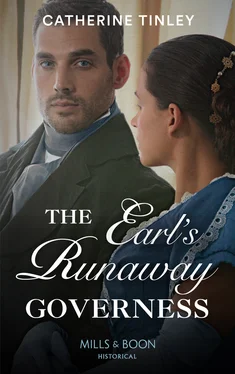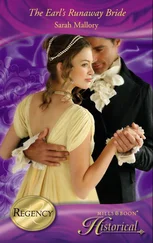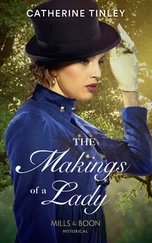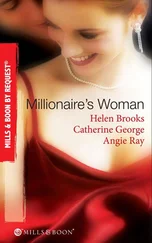‘I will.’
Marianne nodded confidently, as if she knew what she was doing. But as she walked up the drive in darkness, away from the only home she had ever known, her heart sank.
How on earth am I to manage? she wondered. For I have never before had to take care of myself!
Grimly, she considered her situation. She had been gently reared, and could play the harp and sing, sketch reasonably well and set a neat stitch. She had been bookish and adept at her lessons when she was younger.
But she had no idea how to buy a ticket for the stagecoach, or wash clothes, or manage money.
She had also never been in a public place unaccompanied before. Mama had always been with her, or her governess, or occasionally a personal maid. But those days were gone. She must learn to dress by herself now, and mend her own clothing, and dress her own hair. And somehow she must keep herself safe in the hell that was London.
London! She knew little of the capital—had never visited the place. But in her mind it was associated with all kinds of vice. London was where Henry lived. London was where his arrogant, lecherous friends lived. London, she had come to understand, was a place overrun with wicked young men, drinking and vomiting and carousing their way through the streets, gambling dens and gin salons.
Mama and Papa had hated to visit the place, and had always exclaimed with relief when they’d returned home to country air and plain cooking. They had never taken her with them, leaving her safely in the care of her nurse or governess, and Marianne had never objected. Even as a child she had understood that London was a Bad Place, and she had been puzzled by Henry’s excitement at going there.
When he had become old enough he had insisted on having lodgings of his own in the city, and with reluctance Papa had given in to his son’s demands. Henry had moved to London, rarely coming home to visit, and everyone at home had breathed a little easier.
And now here she was, leaving home in the middle of a cold January night, with little money, no chaperone, and no notion of how she was going to manage. And she was choosing to go to London, of all places.
She stifled a hysterical giggle. Strangely, the absurdity of it all had cheered her up. That she could laugh at such a moment!
She lifted her chin, squared her shoulders, and trudged on.
William Ashington, known to his friends as Ash, rubbed his hands together to keep away the cold. The vicar’s words washed over him. ‘For as much as it hath pleased Almighty God in his great mercy to take unto himself the soul of our dear brother here departed: we therefore commit his body to the ground—earth to earth, ashes to ashes, dust to dust...’
Ash threw a handful of earth onto John’s coffin, feeling again the loss of the man who had been much more to him than a cousin. In truth John had been like a brother to him—at least until that summer when they had both turned eighteen. In recent years they had recovered something of an awkward friendship, but it had never been the same.
How could it?
He turned away as the service ended, accepting a few handshakes and murmuring appropriate responses to the expressions of sorrow being offered.
‘My Lord?’ It was the vicar. Ash started, realising the man was addressing him. Strange to think that because of John’s death he was now not simply Mr Ashington but the Earl of Kingswood.
‘Yes?’
The vicar shook his hand and thanked him for attending the service. ‘A funeral is always a sad occasion, but laying to rest such a young man is doubly sorrowful. Why, he was not much more than two and thirty!’
I know , thought Ash. For John and I are—were—almost the same age .
‘And to think of his widow and daughter, now left alone in the world...’ The vicar sighed, then looked at Ash intently. ‘Lord Kingswood—er...the previous Lord Kingswood spoke about them often to me in his final weeks.’
‘Indeed.’ The last person Ash wished to think about was John’s widow. Thank goodness women did not attend funerals.
‘He also spoke about you.’ The vicar’s warm brown eyes bored into Ash’s. ‘I think he regretted the distance between you.’
Ash was feeling extremely uncomfortable. He was unaccustomed to discussing his personal affairs with someone he had just met. In truth, he was unaccustomed to discussing his personal affairs with anyone. He preferred it that way.
Adopting his usual defence in such moments, he maintained an even expression and said nothing.
The vicar made a few more general comments and Ash listened politely. He thanked the man and turned away to where his coachman, Tully, waited with the carriage. If he left now he could be back in London by tonight.
‘Er...’
The vicar. Again.
‘Yes?’ Ash’s patience was beginning to wear thin, but he forced himself to maintain a courteous expression.
‘I was asked to pass this to you.’ He offered Ash a sealed note.
Ash frowned but took the paper. Opening it, he ran his eyes over the contents.
‘Confound it!’ he snapped, causing the vicar to raise an eyebrow. ‘I am requested to go to the house after the funeral. By the family lawyer.’
The vicar looked bewildered at his reaction to what must seem a perfectly reasonable request. They were literally standing together at the Fourth Earl of Kingswood’s funeral, and Ash was now the Fifth Earl.
But he had never expected to accede to the title.
Why, John had been only thirty-two, with plenty of time to sire a son with Fanny. Everyone—including Ash—had assumed that John would eventually have sons, and that he—Ash—would never have to worry about the responsibilities John had carried for so long.
Ash debated it in his mind. Could he ignore the note and leave immediately for London, as planned? He could ask the lawyer to see him there. No . It would look churlish and impolite. Damn . He would have to comply as a courtesy. Which meant possibly seeing her again.
Fanny. John’s wife—John’s widow , he corrected himself. After all these years of successfully avoiding her.
Placing his hat firmly on his head, he bade farewell to the vicar and made for his carriage. If he must face this ordeal, better to get it over with.
Marianne reminded herself to breathe. Her shoulders were tense and she could feel fear prick her spine. She had paid the fee and entered her name into the registry book at the office recommended by Mrs Bailey, and now she waited.
Well, she acknowledged, not her actual name. Her made-up name.
She had decided during the long journey to London that she must not go by her usual name, for fear Henry might look for her. She would use her father’s surname—her real father—as it would give her comfort, and she was confident Henry would not remember or recognise it.
After being known as Marianne Grant for most of her twenty years, she would now go back to the surname she had been given at birth—Bolton. Charles Bolton had given her her dark brown eyes, her dark hair and, according to Mama, her placid nature. The Grants were altogether more fiery.
She was seated in an austere room with a dozen other would-be servants, all patiently awaiting their turn to be called. Among the would-be grooms, scullery maids and footmen she had espied two other young ladies, respectably dressed, who might also be seeking employment as governesses. She had exchanged polite smiles with both of them, but no one had initiated conversation.
It was greatly worrying that on a random Tuesday there were three young ladies of similar social standing all seeking positions at the same time.
Читать дальше












